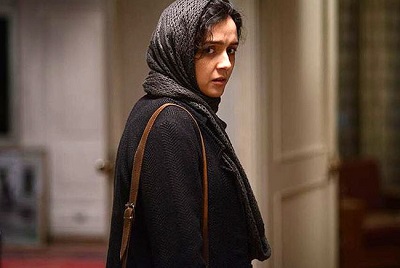
By Amir Ganjavie.
Asghar Farhadi’s newest film, The Salesman, recently won prizes at Cannes for both Farhadi’s screenplay and for Shahab Hosseini’s lead performance. The film presents the familiar idea of private space being disrupted and touches upon the question of how violence emerges in society and how a non-violent and peaceful character can turn monstrous. Farhadi adds another layer to the situation by drawing a connection between Arthur Miller’s play Death of a Salesman (1950)and the story of modernization in Iran. Farhadi’s whimsical yet solemn film would have been impossible to create without the help of Taraneh Alidoosti and her great performance. Alidoosti previously collaborated with Farhadi on the films The Beautiful City (2004), Fireworks Wednesday (2006), and About Elly (2008). Her energy, dedication, and meticulous performances play a significant role in the success of The Salesman. After the screening of the movie at Cannes, I interviewed Alidoosti about the role and Farhadi’s meaning for her.
First of all, I’m interested to know what Farhadi meant to you before performing in The Salesman. What is in his cinema for you?
We were very young when we started to work with each other in the Iranian cinema and I actually have a certain distance from him which enables me to interpret his work in a way. I can say that he has changed Iranians cinema with About Elly in that he has brought its technically and thematic to a different level. Many, many, many filmmakers have tried to emulate Farhadi’s style, to repeat his way of writing dialogue, or to change the dynamics of their movies in order to be more like his.
What was your reaction when you first read the script of The Salesman?
I didn’t read it; he told it to me. He took three hours to explain every scene in detail and then he handed me the script. That’s what he always does and he’s a perfect storyteller so I was glued to my seat and was quite excited to be hearing about it, just as I would imagine is the audience when watching the movie, though I haven’t seen it yet.
Can you describe your character in the movie?
Well, this time she’s not that different from myself since she’s a young actress in Iran living her somewhat modern life in a loving relationship with a good husband with whom she is also good friends. So, in that sense, she’s not a different personality from me. What happens to her is what makes her unique. It’s a situation which I think that every woman can at least imagine. It’s not very difficult to imagine such a thing happening to you as a woman and what your reaction would be so it really touches your heart.
Does Farhadi have a specific style of acting that he asked you to do?
Yes, he always has a very long period of rehearsals before he starts to film a movie, which helps a lot because it kind of unites all of the actors with the directors and also I think gives everyone an idea of what the film should look like. So there is this… What’s the word? All of them have one voice when they come out of this rehearsal so that makes it very easy to kind of get into the characters in front of the camera and to know who they are.
Like previous Farhadi films in The Salesman family and morality are still very important. Do you have any comment on this?
Well, I’m not sure about family but morality yes, of course, because we have a character who wants to make the world a better place. He only wants to solve his own problems but we see from the beginning of the movie that he has beliefs about how to make things perfect when he talks to his students. He is like that but we also see that being good in an extreme way is problematic. You cannot force people to share your beliefs even if you think they are right. Turning to violence because of that is what makes you an extremist, which you don’t want to be.
In the movie you also play a theatrical performer. Did that require you to do any specific training or were you familiar with theatre?
Yes, we did also rehearse the play because Shaho and I had to play other roles within the film and those characters have different ages. So we also had the additional roles of Willy Loman and Dandoman. We rehearsed those but you see in the movie that there was not that much to do since the play only makes up a few little scenes.
Is there any specific experience that you will remember from this movie?
No, not that I can really think of right now.
Do you have anything to say about your experience of being in Cannes?
It was my first time in Cannes. Many of my movies have been featured at festivals around the world but it was about time that I had a movie in Cannes since I’ve been working for sixteen years. I was really looking forward to showing up in Cannes so I’m very happy that we made it there.
Fascinated by the issue of alternative and utopian space in cinema and architecture, Amir Ganjavie has published widely about cinema, architecture and cultural studies. He co-edited a special volume on alternative Iranian cinema for Film International and edited Humanism of the Other, an essay collection on the Dardenne brothers (in Persian). His most recent contribution is an article on the meaning of space and utopia in cinema by analysing the films of Tsai Ming-Liang.
